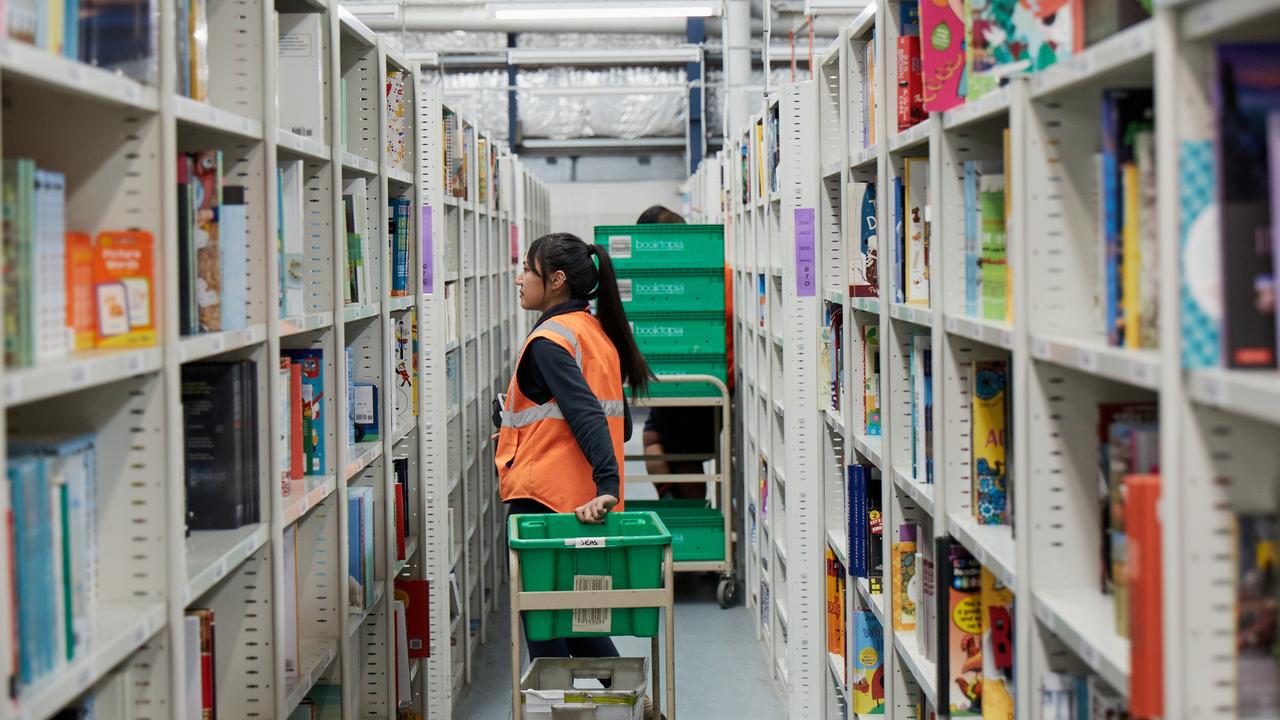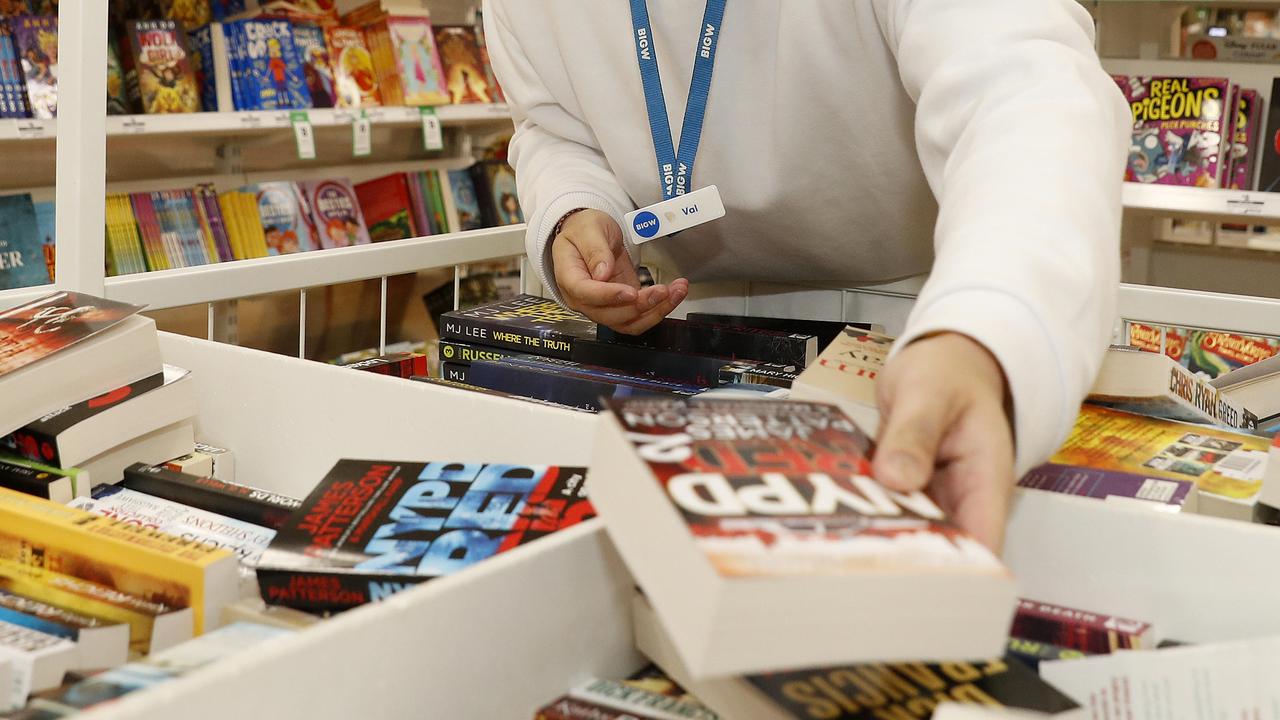‘Disaster’ as ASX-listed retailer collapses
Heavy discounting, competition from Kmart and Big W and a $12m gamble were signs of a “road to ruin” but another “disaster” is looming from the failure.
There are warnings the collapse of popular online retailer Booktopia will be “disruptive” to the industry as questions are raised about the company pumping $12 million into a robotic warehouse.
Booktopia had been teetering on the brink of collapse after it had halted trading on the ASX on June 13. On Wednesday its woes were confirmed when it was announced it had gone into voluntary administration.
Australia’s largest bookseller had been haemorrhaging money – recording a $16.7 million loss for the six months to December 31 – while it had also recently laid off 50 staff and its former CEO resigned after spending less than a year in the role.
Now administrators from McGrathNicol are undertaking an “urgent assessment” of the business with a focus on a possible sale or restructure.
The company had debuted on the ASX with a share price of $2.86 but it has since plummeted by 98 per cent to a rock bottom price of 4.5 cents.
Robbie Egan is the chief executive of the Australian bookseller’s association BookPeople. He warned Booktopia’s failure would be “really disruptive” to the bookselling sector, leaving a “big hole” in the industry and pumping up Amazon’s already huge profits.
Do you know more or have a similar story? Contact sarah.sharples@news.com.au

He said the assumption that book shops were “dead” and going out of business was false but the failure of Australia’s biggest online bookseller was a “disaster”.
“Without it everything goes to Amazon, which is a disaster,” he told news.com.au.
“Other businesses can’t avail themselves of international tax minimisation strategies like Amazon does and it’s not great for Australian writers or the Australian economy.”
Booktopia had enjoyed a wave of sales during the Covid-19 pandemic, when people were stuck indoors with extra cash to spend.
The book company’s sales surged, raking in $223.9 million in turnover in the 2021 financial year. The following financial year it made even more, at $240.8 million.
While the sales results were “spectacular” during Covid, Mr Egan said it was clear that the boom wouldn’t last forever.
“I believe they would have tooled up to be prepared for that ongoing sales environment, but everyone had a huge boost during that time, even independent bookstores that had closed their doors had a boost,” he said.
“It was unrealistic to expand the business but there is an assumption they built that huge facility with robotic capabilities and there must be issues with it.”

The $12 million robotic warehouse was constructed in the Sydney suburb of South Strathfield and opened last year but had encountered troubles and failed to provide the cost savings Booktopia had expected
However, a combination of factors had hit Booktopia, according to Macquarie University professor of marketing Jana Bowden.
This included the cash crunch hitting consumers and affecting discretionary spending through to an expectation that the post-Covid book sales boom would just roll on, she said.
“Revenue is falling in book sales. Nielsen data shows it was down 3 per cent at the close of 2023, and annual growth is only forecast to be 3.2 per cent through 2024,” she noted.
“Couple that with Big W, Amazon and Kmart taking the top three positions as the biggest brands for book sales by store in Australia this year with Booktopia dragging its feet behind in fourth place then you are left looking at the perfect storm. And that’s before you throw in the business problem of overinvestment in automation.”

Mr Egan added Booktopia had also “lost their way” when it came to sales too.
“They would discount extremely heavily and you can discount but not in a crazy manner, but they were selling new books at nearly half price, so it was like they were on the road to ruin,” he added.
“Online is about scale and building scale but completely giving away margins isn’t sustainable. There must be a whole host of reasons it failed, the debt structure seemed wrong and I guess they just grew suddenly too quickly and weren’t able to cope, it seems.”

Its collapse will impact smaller book shops too, as Booktopia was a distributor that supplied books, he revealed. It would also hurt publishers and authors.
“We’ve already had some bookseller members wondering what is going to happen with orders they had with Booktopia and they are concerned that is probably money lost as most members are paying upfront,” he said.
“Australian writing relies on Booktopia a lot with it selling a lot of Australian books written by Australian authors, which is problematic. Authors earn $12,000 per annum on average and that is not a liveable wage.
“This is a huge channel and a stream for particularly small Australian publishers, but the larger publishers will feel this more. There are a lot of people that have lost jobs and a lot of people that have lost money – it’s a terrible thing all around.”
In June, the embattled eCommerce business cut 50 roles from its Sydney head office in the northwestern suburb of Ryde, following on from the 40 people Booktopia made redundant in January last year.
There are reports Australia’s biggest retail book chain Dymocks is considering purchasing parts of the Booktopia business.
sarah.sharples@news.com.au






